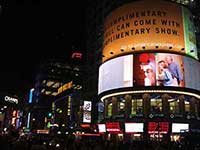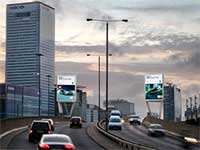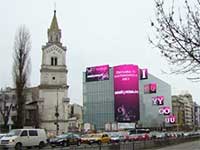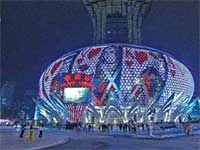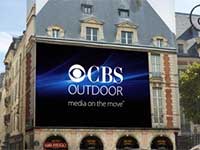Electronic screens in European cities
Modern design and architecture tend to be bright, unconventional and ergonomic. People buy everything unusual, appealing and baffling imagination. Companies work overtime to impress potential customers by super powerful cars in retro design, transparent PC monitors and telephone sets, shoes with 20 cm heels, etc. After all, efficiency equals sales. And sales directly depend on advertising. Is it surprising that commercials tend to become dazzling, aggressive, tempting? Companies are constantly searching for ways to promote their products and services. That is exactly what large electronic screens are meant for being the new format for broadcasting commercial messages.
Electronic screens are expensive and fairly difficult to operate and maintain (need professional service). Until recently the only buyers and operators of such screens were limited to advertising agencies. They have immediately recognized advantages of this equipment, its tremendous potential in attracting advertisers, boosting advertising budgets and extracting maximum profits from one advertising site.
However the advantages of dynamic electronic advertising with TV quality are so obvious that gradually more and more businessmen woke up to the necessity of using electronic screens for the benefit of their companies. However, small and mid-sized firms rarely possess sufficient financial and technical resources to buy a screen for their own use. It is much easier for them to buy advertising time from other screen operators. Or to place a neon sign above the entrance.
Large companies have a different approach. They already have a certain market niche and fight for keeping and expanding their market share. For large companies electronic screens is a godsend. Companies buy and install screens for their own use: near the central headquarters, on the wall or roof of their marketing center. The first such customers were casinos in well-known gambling centers in Las Vegas and Monaco. For them the electronic screen was an ideal advertising sign, one more bright spot with any desired image or message. Large trading companies and shopping centers like Wall Mart and Macy’s soon followed the suit. Another operator of large electronic screens for “internal use” are large hotel chains. They offer such wide assortment of services that a list would be too long for any number of billboards. But the electronic screens allow to write any amount of text formatted and illustrated in the most attractive format. Buying a screen is a relatively minor investment for such large companies, while ownership gives them unlimited advertising time around-the-clock.
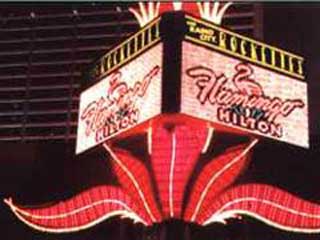 |
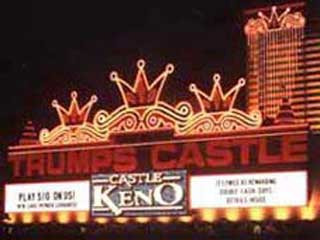 |
| Large electronic sign screen display at Hilton Hotel | Large electronic advertising sign display screen of casino |
For such companies electronic screens become not only the advertising means but a new and attractive gadget fairly uncommon and therefore prestigious. After all, if a company spends a lot of money on appearance and outward respectability, including fashionable office equipment, impeccable office repairs, expensive cars, an electronic screen on a HQ rooftop is but another way to demonstrate financial stability and flourishing to competitors and general public.
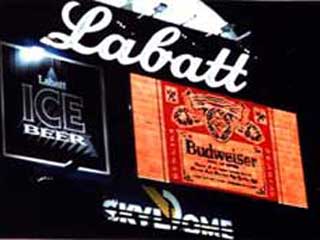 |
 |
| Large electronic screen sign display | Large electronic video screen sign display in Paris |
Practically every European city is an architectural museum. It is not an easy task to create modern buildings and structures that would not spoil the general view and offend an eye of an impartial critic. Unfortunately, there are plenty of instances when designers botched the job. The Pompidou center tangled in pipes or a pyramid in the Louver used to infuriate the public. The recently commissioned “Eye of London” is another such example. However after a year or two the passions die down, and new buildings become the focus of public controversy, while the “old” ones gradually shift to the rank of acceptable classics.
Similar to new buildings, outdoor advertising changes the landscape of our cities makes their appearance eclectic. No doubt, the electronic advertising is more noticeable and intrusive than common billboards. But the electronic screens possess an important quality: they decorate towns. Naturally, the company that installs an electronic screen on its office building becomes highly conspicuous. The screen becomes a powerful and respectable tool of self-advertising and competition. This is the reason why more and more such screens appear around the world.

